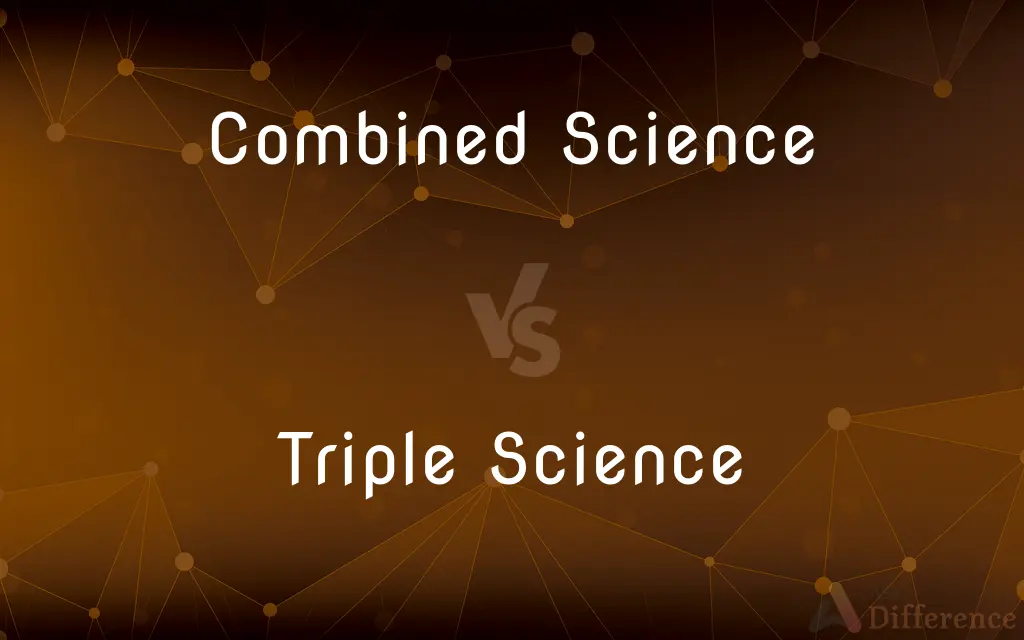Combined Science vs. Triple Science — What's the Difference?
Edited by Tayyaba Rehman — By Urooj Arif — Published on June 29, 2024
Combined Science covers core scientific concepts across biology, chemistry, and physics in a condensed manner. Triple Science delves deeper, offering separate GCSEs in each science subject.

Difference Between Combined Science and Triple Science
Table of Contents
ADVERTISEMENT
Key Differences
Combined Science, often taken in UK secondary education, integrates key elements of biology, chemistry, and physics into a single course, resulting in a double GCSE. This approach provides a broad understanding of science, suitable for students seeking a general science education. In contrast, Triple Science allows students to study each of the three sciences as distinct subjects, leading to three separate GCSEs, offering a more comprehensive and in-depth exploration of each scientific discipline.
Students taking Combined Science are assessed across all three disciplines, but the depth of content is less than that in Triple Science. This makes Combined Science a good option for students who may not wish to pursue science at A-level or as a career but still need a solid scientific foundation. On the other hand, Triple Science is often chosen by students with a strong interest in science or those considering science-related A-levels or careers, as it provides a more detailed and rigorous scientific education.
The workload for Combined Science is generally lighter than for Triple Science, reflecting the broader but shallower approach to covering scientific topics. Triple Science, with its more detailed curriculum, requires more classroom hours and study time, making it a more demanding option that can offer greater rewards for students committed to science.
Schools may have specific entry requirements for students wishing to take Triple Science, often based on academic performance or teacher recommendations, due to the course's demanding nature. Conversely, Combined Science is typically available to a broader range of students, providing essential scientific literacy without the intensity of Triple Science.
The choice between Combined Science and Triple Science can significantly impact a student's future academic and career paths. Triple Science can open doors to more specialized science courses and careers, while Combined Science offers a foundational understanding beneficial for a wide range of fields.
ADVERTISEMENT
Comparison Chart
GCSE Qualifications
Double GCSE in Science
Three separate GCSEs in Biology, Chemistry, and Physics
Curriculum Depth
Covers core concepts in each science, less depth
Detailed study of each science, more in-depth
Suitability
Students seeking general science knowledge
Students interested in specialized science studies
Workload
Generally lighter, fewer classroom hours
Heavier, more classroom hours and study time
Future Opportunities
Provides foundational knowledge for various fields
Opens pathways to specialized science fields and studies
Compare with Definitions
Combined Science
Offers a foundational science education.
It lays the groundwork for informed citizenship and diverse career paths.
Triple Science
Requires more time and effort.
The curriculum's depth necessitates a significant commitment to study.
Combined Science
Integrates biology, chemistry, and physics.
Combined Science offers a holistic view of scientific principles.
Triple Science
Enhances future science opportunities.
Completing Triple Science can ease the transition to higher-level science courses.
Combined Science
Results in a double GCSE.
Students receive two GCSE grades reflecting their overall science understanding.
Triple Science
Leads to three GCSEs.
Each science subject is assessed and graded separately.
Combined Science
Suitable for a broad student base.
Combined Science is accessible to students with diverse academic interests.
Triple Science
Aimed at science-oriented students.
It's ideal for those considering science at A-level or as a career.
Combined Science
Less intensive study.
The course is manageable for students balancing a wide range of subjects.
Triple Science
Offers in-depth study of each science.
Triple Science students explore complex concepts in biology, chemistry, and physics.
Common Curiosities
What does Triple Science entail?
Triple Science involves studying biology, chemistry, and physics as separate subjects, each leading to its own GCSE.
Is the content in Combined Science easier?
The content is not necessarily easier but is covered with less depth compared to Triple Science.
Does Triple Science require more homework?
Yes, due to its depth and breadth, Triple Science generally involves more homework and study time.
Who is Triple Science for?
Triple Science is aimed at students with a strong interest in science, considering further science education or careers.
What is Combined Science?
Combined Science is a GCSE course that provides a broad overview of biology, chemistry, and physics, resulting in a double GCSE.
Who should take Combined Science?
Combined Science is suitable for students who want a comprehensive science education without the intensity of specializing in each subject.
How does Triple Science affect career options?
It can open more specialized science career paths, although many careers value a broad scientific education as well.
Can I switch from Combined to Triple Science?
Switching is possible but depends on the school's policy and the student's performance.
How do the GCSE qualifications differ?
Combined Science awards a double GCSE, whereas Triple Science results in three separate GCSEs in biology, chemistry, and physics.
How are the exams structured for each option?
Combined Science exams cover all three sciences in a format that leads to two grades, while Triple Science has separate exams for each science.
Is Combined Science considered less rigorous?
It's less specialized but still provides a strong foundation in scientific principles.
Are Triple Science students at an advantage for A-levels?
Triple Science can provide a solid foundation, potentially making the transition to science A-levels smoother.
Can Combined Science students pursue science A-levels?
Yes, but they might need to work harder to bridge any knowledge gaps, especially in more specialized areas.
Do universities prefer Triple Science?
For science-related courses, Triple Science may be advantageous, but many factors are considered in university admissions.
What are the benefits of studying science at the GCSE level?
Both options enhance critical thinking, problem-solving skills, and scientific literacy, valuable in numerous career paths and daily life.
Share Your Discovery

Previous Comparison
Elect vs. Vote
Next Comparison
Chipotle Powder vs. Chili PowderAuthor Spotlight
Written by
Urooj ArifUrooj is a skilled content writer at Ask Difference, known for her exceptional ability to simplify complex topics into engaging and informative content. With a passion for research and a flair for clear, concise writing, she consistently delivers articles that resonate with our diverse audience.
Edited by
Tayyaba RehmanTayyaba Rehman is a distinguished writer, currently serving as a primary contributor to askdifference.com. As a researcher in semantics and etymology, Tayyaba's passion for the complexity of languages and their distinctions has found a perfect home on the platform. Tayyaba delves into the intricacies of language, distinguishing between commonly confused words and phrases, thereby providing clarity for readers worldwide.













































